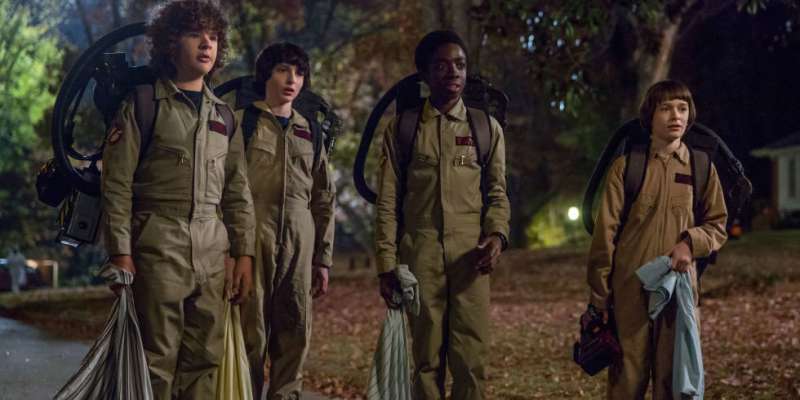Credit: Netflix
If you binge-watched Stranger Things 2 this past weekend, you're far from alone. While Netflix doesn't release ratings, the show set a record as the most tweeted-about streaming show, generating 3.7 million tweets in its first three days, according to Variety. Netflix also recently coined the term "binge-racing," which refers to watching a new season of a show within 24 hours of its release, and said more than 8.4 million members have binge-raced shows.
All this got us thinking: how well do you remember a show when you're plowing through it in one day, compared to watching it over time? One recent study found that while binge-watching leads to strong memory formation immediately, those memories decay faster than those of people who watched over longer viewing schedules.
We asked cognitive neuroscientist J. Benjamin Hutchinson, assistant professor in the College of Science at Northeastern who studies memory and attention, to explain the relationship between binge-watching and memory. He also offered some advice on how binge-watchers might help themselves better remember shows over the longer term.
Do you binge-watch?
I definitely have, but I don't have time to polish off a season of Stranger Things in one day. I've been knocking out one or two episodes of the new season a night, and I'm now up to episode six. Once a show becomes available, I might watch a couple episodes at once and then the rest later. The last show I binge-watched was House of Cards.
How does binge-watching affect how we remember a show?
This is a new spin on a fairly old question. I talked to some of my colleagues, and we all agree we enjoy binge-watching. But in terms of memory, there's quite a bit of evidence that memory is impaired or becomes worse if you watch a show all at once than when you space it out. It's the same reason why you should study for a test over the course of a few weeks, rather than cram.
What are the reasons for this?
There are a couple of explanations, but perhaps the most powerful is that one of the best ways to remember something for later is to retrieve it—that is, remember it from the past. And if you have a week in between episodes, you have more time to retrieve that memory throughout the week.
Another factor is something memory researchers call consolidation. Once you're exposed to something, it's stored into your longer-term memory. Consolidation benefits greatly from sleep. If you stay up 18 hours to watch a show, you won't have time to sleep and consolidate what you've learned. If you watch one episode a week, however, you have many more opportunities to consolidate that single episode.
Lastly, research has shown that if you space out your learning events, what's going on around you changes and those details can help you remember better. On one night you watch an episode at home, the context will be different than the next week when you watch it at a friend's house. This change in context helps you generalize what you're watching when you go to remember it later. But if you watch a show all day on the couch, your context is the same and so you might have more difficulty remembering it in new situations.
We know that people will be binge-watching Stranger Things 2, if they haven't already. How can they best remember it?
Well, it's one thing if you want to memorize it. If you're taking a test, you want to space things out and revisit the subject matter. If the goal is to enjoy the show, that might mean taking in the entire series on a Saturday afternoon.
In terms of advice, taking breaks might help, mainly because it's not natural to be doing one thing for a dozen hours at a time. You'll be more aware and have more energy. If you're really set on binge-watching, after each episode you can try to think back on what just happened in that hour before starting the next one. That ties back to remembering, which is one of the best forms of studying.
So you're saying that binge-watching effectively can make you a better studier?
It's very analogous to cramming, I think. Sure you might get exposed to a lot of information quickly. But if you care about learning the information for the long term, you want to space it out.
Provided by Northeastern University























